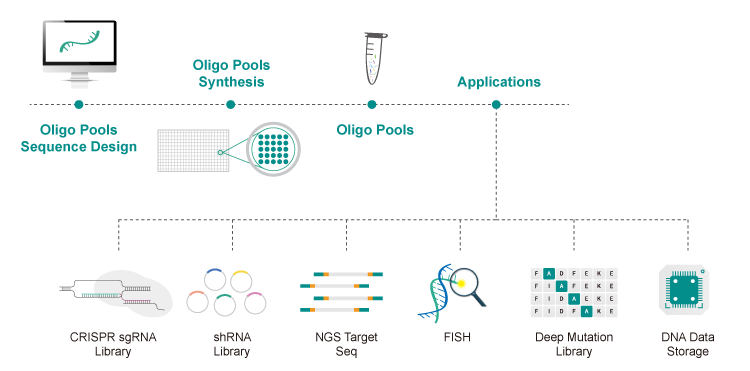In the evolving landscape of genomics and synthetic biology, oligo pools have emerged as powerful tools. But beyond their synthesis, the real value lies in how they’re applied in downstream workflows to drive innovative research, from CRISPR libraries to antibody discovery and gene expression studies.
What are Oligo Pools?
Oligo pools are collections of thousands to millions of unique DNA or RNA sequences, synthesized in parallel. By producing these sequences in large quantities, researchers gain the flexibility to design complex experiments with unparalleled precision. Oligo pools are especially valuable because they provide a scalable, high-throughput solution for screening, discovery, and validation in various biological and therapeutic applications.
What are applications of Oligo Pools?
1. CRISPR Libraries for Functional Genomics
CRISPR technology has redefined genome editing, making it possible to target specific genes with precision. Oligo pools enhance this capability by enabling the creation of guide RNA (gRNA) libraries for large-scale CRISPR screens. These libraries allow researchers to target thousands of genes in parallel, systematically probing gene functions and interactions. This is particularly useful in identifying genetic factors involved in complex diseases or drug resistance. For example, a study by Shalem et al. demonstrated the effectiveness of CRISPR libraries in pinpointing genes linked to drug resistance in cancer cells. This approach can guide the development of new therapeutic strategies by revealing crucial gene interactions.
Beyond drug resistance, CRISPR libraries generated through oligo pools are also used in studying immune response, neural function, and metabolic regulation. This high-throughput approach enables a more comprehensive understanding of gene networks, providing valuable insights for personalized medicine.
2. Antibody Discovery and Optimization
Oligo pools are also pivotal in antibody engineering, where they help generate diverse antibody libraries. These libraries, created by synthesizing various oligonucleotide sequences, contain a wide array of antibody variants. The diversity provided by oligo pools is crucial for identifying antibodies with high specificity, binding affinity, and therapeutic potential. Researchers can screen these libraries to find optimal antibody candidates for targeting specific pathogens, cancer cells, or autoimmune components.
In addition to therapeutic antibody discovery, oligo pools also support the development of diagnostic antibodies and nanobodies. These specialized antibody fragments are small, stable, and highly specific, making them suitable for applications in imaging, targeted drug delivery, and non-invasive diagnostics. The ability to create and screen diverse libraries quickly makes oligo pools invaluable for both therapeutic and diagnostic antibody development.
3. Gene Expression Studies and Promoter Screening
Gene expression is a highly regulated process that controls cellular functions, differentiation, and response to environmental signals. Oligo pools allow researchers to conduct high-throughput screening of promoter and enhancer sequences, helping to identify regulatory elements that control gene activity. By introducing oligo pools with diverse regulatory sequences into cell systems, scientists can monitor changes in gene expression and select the most effective sequences for synthetic biology or therapeutic applications.
In synthetic biology, oligo pools are used to design synthetic promoters with tunable expression levels, enabling precise control over gene circuits in engineered organisms. In therapeutic gene delivery, screening with oligo pools can help identify promoters that ensure stable, long-term expression in target tissues, which is essential for gene therapy applications targeting diseases like cystic fibrosis, hemophilia, and muscular dystrophy.
Practical Tips for Working with Oligo Pools
Design with Precision: The effectiveness of oligo pools depends heavily on their design. Use specialized software to ensure that each oligo sequence meets the experiment’s requirements.
Choose Quality Over Quantity: While it’s tempting to synthesize as many sequences as possible, quality control is essential. High-fidelity synthesis processes help minimize errors, making your data more reliable.
Optimize the Workflow: Integrate oligo pools with compatible downstream processes, such as next-generation sequencing (NGS) or high-throughput screening platforms, to maximize their utility.
Why choose Synbio Technologies?
At Synbio Technologies, we're committed to providing high - quality, customized oligo pools for your research. Using advanced inkjet synthesis technology, we ensure sequence fidelity, precision, and homogeneity. Our flexible design and custom synthesis services match your downstream applications, spanning functional genomics, drug development, and synthetic biology.

References
[1] Shalem, O., Sanjana, N. E., Hartenian, E., Shi, X., Scott, D. A., Mikkelsen, T. S., … & Zhang, F. (2014). Genome-scale CRISPR-Cas9 knockout screening in human cells. Science, 343(6166), 84-87.
[2] Soderlind, E., Strandberg, L., Jirholt, P., Kobayashi, N., Alexeiva, V., Aberg, A. M., … & Uhlen, M. (2000). Recombinant antibody libraries: a certain future. Journal of Biotechnology, 74(3), 277-302.
[3] Melnikov, A., Murugan, A., Zhang, X., Tesileanu, T., Wang, J., Rogov, P., … & Kinney, J. B. (2012). Systematic dissection and optimization of inducible enhancers in human cells using a massively parallel reporter assay. Nature Biotechnology, 30(3), 271-277.
 DNA Synthesis
DNA Synthesis Vector Selection
Vector Selection Molecular Biology
Molecular Biology Oligo Synthesis
Oligo Synthesis RNA Synthesis
RNA Synthesis Variant Libraries
Variant Libraries Genome KO Library
Genome KO Library Oligo Pools
Oligo Pools Virus Packaging
Virus Packaging Gene Editing
Gene Editing Protein Expression
Protein Expression Antibody Services
Antibody Services Peptide Services
Peptide Services DNA Data Storage
DNA Data Storage Standard Oligo
Standard Oligo Standard Genome KO Libraries
Standard Genome KO Libraries Standard Genome Editing Plasmid
Standard Genome Editing Plasmid ProXpress
ProXpress Protein Products
Protein Products
























